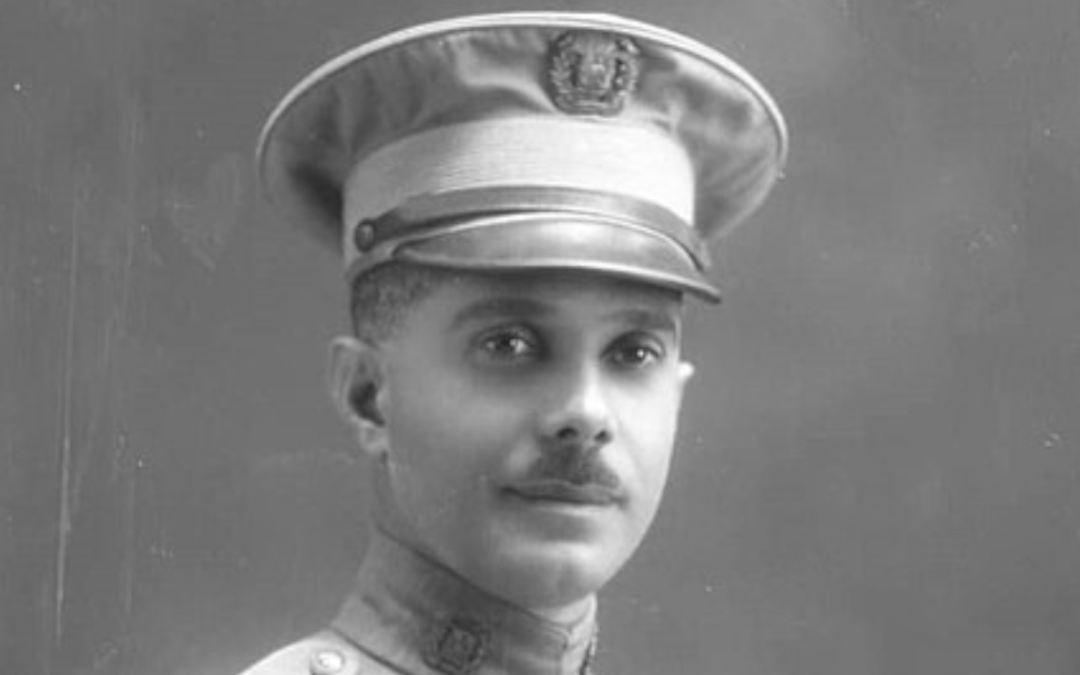There is a tendency to view dictators in a specific light – a strongman who seized power through illegal means. Shadowy figures who lurk in the dark, emerging only when their country is in crisis. For many dictators this is an accurate description. But no stereotype is entirely accurate. I’m not talking about benevolent dictators, or ones who gave up power willingly – I’m talking about dictators who were elected. Each of their stories are as unique as they are surprising. To illustrate this, here are ten deeply interesting dictators who were elected.
10: Chiang Kai-shek, Taiwan
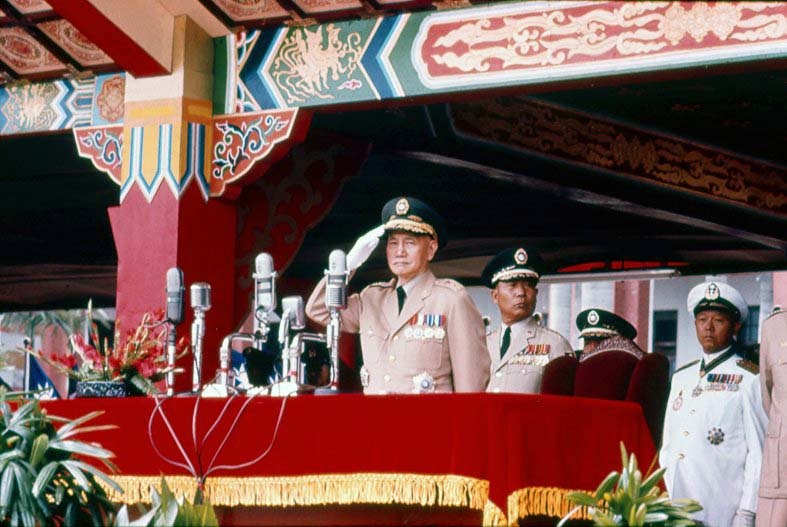
Chiang Kai-shek was the most powerful man in China… until he wasn’t. Even after years of fighting against the Japanese in world war 2, he was considered the favorite to win the Chinese civil war, leading the nationalist forces against Mao’s communist army. But that is not what fate had in store for Chiang. Four more years of battle saw his side weakened and the communist side gain ground. In 1949 the nationalists fled to the island of Taiwan, establishing a new political regime and claiming it to be the single legitimate state of China. As leader of the cause, Chiang Kai-shek naturally assumed leadership of Taiwan.
Under his premiership Taiwan was transformed from an impoverished and unequal backwater to a financial hub of the modern world. He did this by enacting land reform, investing foreign aid strategically, and adopting an export-based economic model. By the time of Chiang’s death in 1975 Taiwan had become a serious economic force. This financial ascension is known as the Taiwanese Miracle.
Despite this, Chiang Kai-shek was a brutal man who maintained power through idealogical terror.
In the initial stages of setting up shop in Taiwan, opposition was mercelessly pacified. At least 140 thousand people were imprisoned – often without trial. It is unknown how many were killed, only that the measures worked. Treatment of rivals was so swift and effective he was able to rule Taiwan as a single party state with little to no instability.
Regular elections were held on the island during his time in power, that fact is undeniable. It’s just that in many of the elections Chiang literally ran unopposed. Even the most ardent defender of his legacy accepts this.
9: Rafael Trujillo, Dominican Republic
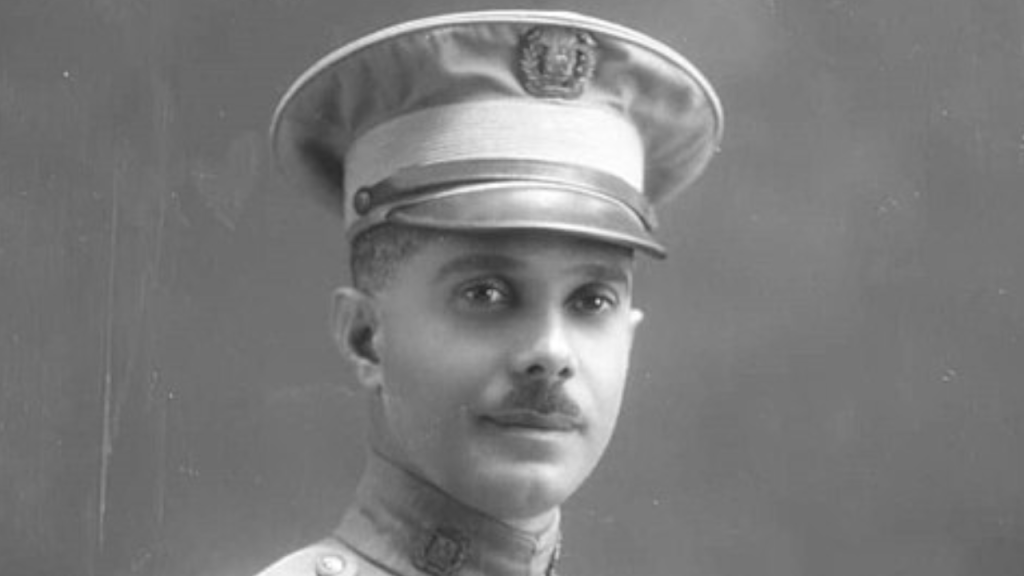
Rafael Trujillo ruled the Dominican Republic for 31 long years. To opponents that was 31 years of corruption, murder, and mayhem. Even conservative estimates hold Trujillo responsible for the deaths of thousands. Some of the more critical sources claim 50 thousand were killed by his regime. This becomes believable when you look into his use of state terror. Infamously harsh towards critics, he regularly ordered the assassination of high profile opponents. Those targeted could easily be native or foreigner. At one point he even tried to have the president of Venezuela killed. This and countless other high profile attacks would give him the image of a bloodthirsty tyrant. So his route to power might surprise you.
In the unstable years of the early 20th century, Rafael Trujillo rose through the ranks of the Dominican military. By 1928 he was a made a general, on top of already being head of police for the entire country. Then in 1930 he cut a deal with rebel leader Rafael Estrella Ureña. Under the terms of the deal, Urena’s rebel troops would march on the capital. Trujillo guaranteed the army and police would not intervene. The government was thus overthrown. Urena was declared acting president, and elections organised. Yet in the election he did not run, not wanting to clash with Rafael Trujillo.
Trujillo was technically elected by a national vote. This is something only certain dictators can boast of. Yet it becomes less of a boast when you learn the full details of the election in question. As a military man, Trujillo had a lot of muscle at his desposal. When other candidates realised the military would preffer them to not win, they began to drop out. One by one all serious political threats to Rafael Trujillo faded away. He went on to become one of the most successful dictators in history, his rule only being ended by his own assassination in 1961.
8: Mohamed Morsi, Egypt

In 2012, Mohamed Morsi became the first democratically elected president in the history of Egypt. Yet still, Egypt during his premiership would be a cauldron of corruption and authoritarianism. In many ways he embodied the Arab Spring, the wave of civil unrest that brought him to power. He was a deeply flawed man, yet clearly better in almost every way than the military dictatorship which proceeded him. Jiust months after taking power he had a new constitution drafted, one that essentially removed judicial limitations on the presidency. In all but name this would have made him above the law. It’s the kind of move only dictators move. It also played a key role in destabilizing his regime, causing massive protests through Egypt.
Before long Mohamed Morsi had lost much of his support, being seen as authoritarian by the public, and a dangerous reformer by the establishment. Then in July of 2013, after just a year in power, Morsi was overthrown via a military coup. Protests against the coup were harshely put down in clashed that saw 800 deaths. But the generals were in some ways careful of how the international community would view the new regime. So instead of executing Mohamed Morsi they locked him away. Six years later he dropped dead in the notorious Tara prison, having suffered all manner of abuse.
7: Heydar Aliyev, Azerbaijan
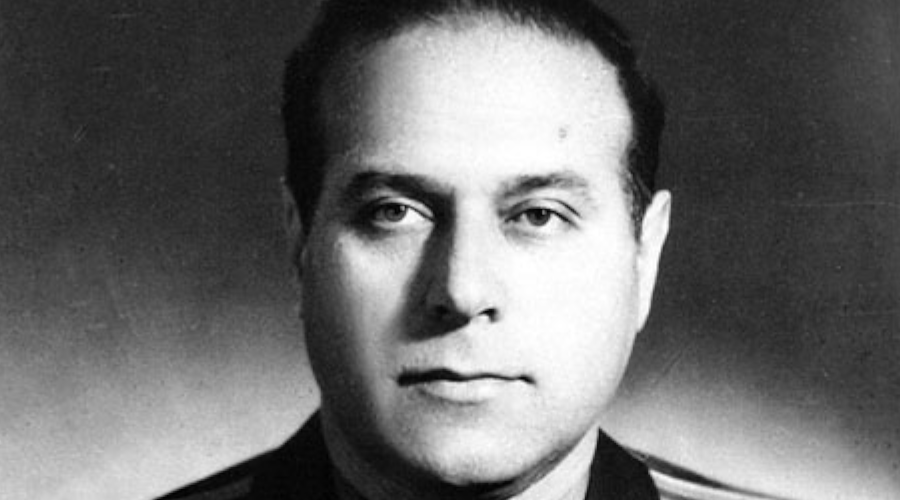
In 1993 the first democratically elected president of Azerbaijan since the absorption of central Asia into the Soviet Union was overthrown by a coup. His replacement was Heydar Aliyev, former KGB chief in Azerbaijan and current influential figure. Aliyev soon organized a new election, in which he won 98 percent of the vote. In many ways it was the typical dictators election, with other serious candidates simply being scared to participate. And so Heydar Aliyev officially became president of Azerbaijan. At the time his country was fighting a brutal war against Armenia, a war it was losing. Almost immediately after Aliyev’s inauguration as president, Azerbaijan lost yet more territory to the enemy. It was a total humiliation, and the next year a peace deal was struck that heavily favored Armenia.
On the plus side, this gave Aliyev’s regime room to solidify it’s grip on power. Following years would see Azerbaijan stabilize, licking it’s wounds while profiting from massive offshore oil reserves. Heydar Aliyev thus had an easy time governing the nation, serving as president until retiring in 2003. He would die later that year of natural causes.
6: Mikheil Saakashvili, Georgia
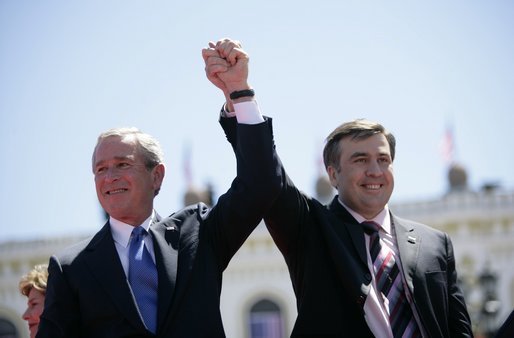
To the north-east of Azerbaijan, Georgia is home to the next of our dictators who were elected. Mikheil Saakashvili came to power in 2004, the previous president being forced out of office by a peaceful revolution. Immediately he got to work reforming Georgia, replacing corrupt officials systematically. His ultimate goal was to radically transform every significant public institution in the country. The fruits of this were plentiful. Georgia’s economy grew 70 percent during his time in office, and Georgian society bloomed. However, Saakashvili himself was authoritarian in numerous ways. Political opponants had a habit of being beaten by police or other state actors. Some political opponants were even murdered. In 2013 he lost power thanks to term limits being in place on the presidency.
Immediately he left Georgia and criminal charges were filed against him. The charges were related to the murder and beatings of political rivals, and he was found guilty in absentia. Meanwhile, he was granted Ukranian citizenship and appointed governor of Odessa. But his time as a Ukrainian official would not last long. Just two years later, in 2017, he was stripped of his Ukrainian citizenship, making him stateless. Since then he has bounced around from country to country as a highly controversial figure. Authorities in Georgia have said they will never pardon Mikheil Saakashvili. But in 2019 his Ukrainian citizenship was reinstated.
5: Robert Mugabe, Zimbabwe

Until 1979 Zimbabwe did not exist. The land itself did, yes. But in it’s place was the country of Rhodesia, a rogue state run by the white minority. This obviously did not go down well with the millions of black Africans living there. So in 1964 a war broke out. Known as the Rhodesian Bush War. Among the main leaders of rebel forces in the war wasRobert Mugabe. So when the government was defeated and white rule ended, Mugabe ran for election. In 1980 the newly formed Zimbabwe held it’s first national election, the result of which was Mugabe being elected prime minister. To his people, Mugabe was a national hero who led them to freedom. But what he had in store for Zimbabwe was far more brutal than anyone realised.
Whether corrupted by power or just corrupt, it was not long until he transformed into a tyrant. Like other dictators who were elected, following elections would be won through violence and blackmail, rather than political reasoning. A key part of his rule was ethno-nationalism. Mugabe stripped white farmers of ownership of their land, and even enouraged his supporters to violently take them over. The result of this was the devistation of Zimbabwe’s rural industry. This in turn resulted in famine and harsh economic decline. When it became clear his policies were making Zimbabwe poor, his government simply started printing money, giving rise to the worst case of inflation in modern history. Yet through fear and fierce nationalism, Robert Mugabe was able to cling onto power. Only in 2017 was he overthrown via a coup, having fominated the nation for almost four decades.
4: Mustafa Kemal Atatürk, Turkey
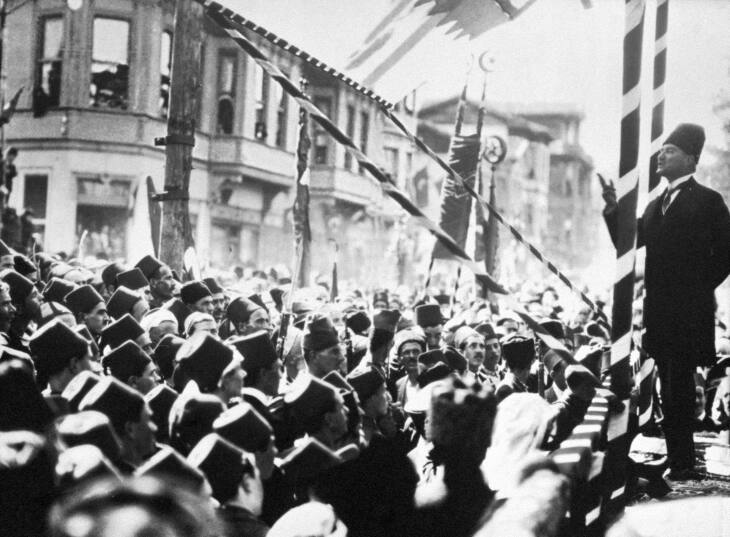
Many would call it harsh to put Mustafa Kemal Atatürk up there with other dictators who were elected, but there is a reason Hitler himself was so inspired by this man. Atatürk is considered the father of modern Turkey, having set up a government in the tail end of world war one. He then defended Turkey militarily from the allies and established Turkey as a republic. These are just a few examples of his greatness, but the man was a giant of the 20th century, and remains a legend in his nation today.
Yet there is also great controversy associated with Atatürk. His sweeping reforms were often handled in a heavy handed way, pushing aside tradition and descending beliefs. Some have called him a benevolent dictator, seeing as his reforms were largely done for the good of Turkey. The problem is that he pushed through these reforms by setting up a one party state, a party under his control.
3: Paul Kagame, Rwanda
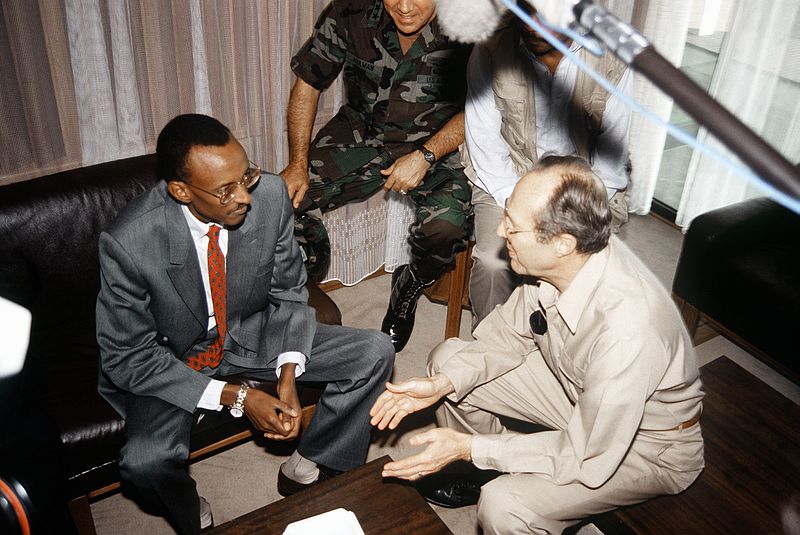
Similar in some ways to Atatürk, many would rebuke any suggestion that Paul Kagame was a dictator. The commander of a rebel army during the Rwandan Civil War, he achieved power by crushing the divided Hutu forces. Said Hutu forces were conducting a genocide against Rwanda’s Tutsi ethnic group. The chaos of this time makes Paul Kagame and his regime look heavenly by comparison. Considered a de facto ruler since 1994, he officially became president in the year 2000 and has run the country ever since. Kagame has won three elections, and seems to be quite popular within Rwanda. The reason why is no great mystery.
His stewardship has seen their economy grow from an inefficeient agricultural backwater to being modern service industry hub. Adapting to modern business trends and rewarding innovation, this tiny nations has seen genuinely impressive economic growth. However, Rwanda is a one party state. There is little government transparency and elections of not fairly executed.
2: Jerry Rawlings, Ghana

Jerry Rawlings is unlike other dictators who were elected in that he was elected after having led as a dictator. Starting off as an officer in Ghana’s air force, he led a successful coup in 1979 that overthrew the government. But after only a few months in power, he willingly resigned in favor of an elected president. Then in 1981he changed his mind. Disatisfied with the reforms of his succeeding president, he launched another coup. Again it was successful, and again Jerry Rawlings took power. But this time he decided to remain in power. In order to do so, he would need to win the hearts and minds of the Ghanian people.
So he re-established diplomatic relations with Libya, which in turn enabled the Ghanian football team to compete in the African Cup of Nations, which that year was held in Libya. As Ghana won the cup, a wave of patriotism swept through the country. Political goodwill came with it, and Jerry Rawlings cemented his position as leader. Then in the 1990s he decided to re-introduce democracy to Ghana. In the 1992 election he received 60 percent of the vote and was officially elected President, a vacant position since his second coup. Thus, Jerry Rawlings became one of the most successful dictators who were elected in history, leading Ghana for another 9 years.
1: Hitler, Germany
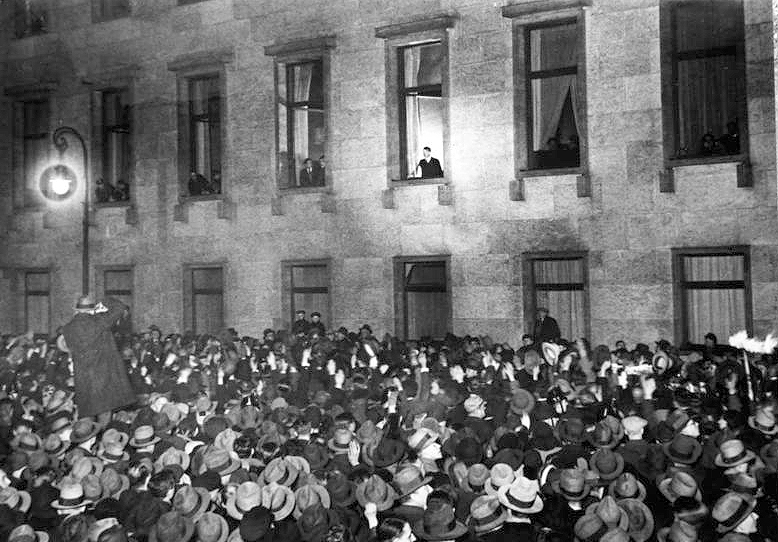
One of the reasons that Hitler’s rise to power is so frightening is that he did so through democratic means. While not technically elected to the top job of chancellor, he was apointed it after the Nazi party became the single largest political party in Germany. The important thing to remember is that the Nazis received only a small number of supporters until after the Great Depression began. In the 1925 election, they got just 3 percent of the popular vote. In all that Germany had been through, it still took the final kick for voters to grow desperate enough to embrace radicalism.

